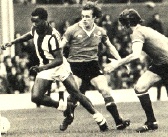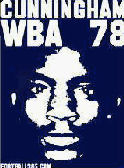
Laurie Cunningham
Born Holloway, March 8, 1956. died 1989.
Laurie Cunningham will probably always be best remembered as being one of West Bromwich Albion’s so called Three Degrees, along with Brendon Batson and Cyrille Regis, in the late 1970’s.
It is unfortunate that Cunningham did not manage to leave us with more of substance to remember him by after a career that promised everything in its early days but petered out amid dreadful injury setbacks before being tragically ended by his premature death, aged 33, following a car crash near Madrid in Spain.
Cunningham began his career at Orient in the second division and immediately made an impression thanks mainly to his blistering pace, he really was a flyer. During his second season in the first team, however, Cunningham’s all round game developed remarkably quickly and marked him out as a star of the future.
His crossing became far more reliable than at first and he also showed a keen eye for goal, capable of creating and finishing his own chances, often out of nothing. It was quickly evident that it was only a matter of time before Cunningham left Brisbane Road for bigger things and it was West Bromwich Albion who took the plunge and signed the exciting winger around the time of his 21st birthday in 1977.
 Cunningham was valued at £110,000 in his move to the Hawthorns which also saw Joe Mayo move in the opposite direction. The new arrival settled instantly with the Baggies and registered six goals in thirteen appearances up to the end of that season, Albion finishing seventh.
Cunningham was valued at £110,000 in his move to the Hawthorns which also saw Joe Mayo move in the opposite direction. The new arrival settled instantly with the Baggies and registered six goals in thirteen appearances up to the end of that season, Albion finishing seventh.
With the arrival of Batson from Cambridge and the emergence of Cyrille Regis out of non league football the following season, Albion became extremely newsworthy as a high profile club fielding three black players. Having come from Orient, Cunningham must have wondered what all the fuss was about.
There was substance to the hype, however, as all three were fine players with Regis proving as explosive as Cunningham was express. These were exciting times at West Brom who had an excellent squad besides this trio and the club won through to the FA Cup semi finals for a memorable clash with Ipswich Town.
Cunningham could only make the bench for this tie and was powerless to prevent a 3-1 defeat, emerging only when centre half and captain John Wile finally submitted to a gaping head wound sustained in a nasty clash which saw Brian Talbot open the scoring and leave the field bloody and concussed.
The following season saw Cunningham truly establish himself as a winger to be feared. He scored nine goals in forty appearances as Albion finished third in the league and backed this up with some dazzling displays as the club made it through to the quarter finals of the UEFA Cup. Cunningham scored in both legs against Galatasaray and was at his very best in both legs of the tie with Valencia, scoring in the 1-1 draw in Spain before torturing the Spanish defence at the Hawthorns, Tony “Bomber” Brown getting both goals in a 2-0 victory.
It was doubtless these two performances, and perhaps his part in the clubs’ famous 5-3 win at Old Trafford against Manchester United, which did most to convince Real Madrid to spend £995,000 in the summer of 1979 to take Cunningham to the Bernebeu.
These were halcyon days for Cunningham as he had just made his full England debut in the Home International match against Wales.
 Cunningham had already become the first black player to represent England at senior level when gaining Under 21 recognition and he would also play “B” internationals as well.
Cunningham had already become the first black player to represent England at senior level when gaining Under 21 recognition and he would also play “B” internationals as well.
Cunningham’s first season in Spain was an undoubted success as he played and scored regularly for Madrid as they claimed a league and cup double.
The season ended in disappointment, however, as first Madrid crashed out of the European Cup at the semi final stage and then Ron Greenwood overlooked Cunningham for his 1980 European Championship squad.
The European Cup defeat was particularly galling. The final itself was set for Madrid’s own stadium and the Spaniards looked on course to win through after winning the first leg of their semi final with SV Hamburg 2-0.
Despite a goal from Cunningham in the return leg in Germany, however, Madrid crashed to an amazing 5-1 defeat and were out.
As for his omission from the England squad, Greenwood would show himself unwilling to accomodate match winning wingers in his squads for both his major finals, and see his team lose out because of an inability to break sides down on both occassions.
There would be little to compensate Cunningham for these disappointments either as a career which should have been approaching its prime became increasingly interrupted by injury.
Cunningham would be fit to take his place in the 1981 European Cup final but could make little impression as a superbly drilled Liverpool side contained Madrid and won out through Alan Kennedy’s second half goal.
Over the next two seasons Cunningham barely made it onto the pitch at all as he suffered a nightmare spell of injuries.
Cunningham regained fitness in time to figure towards the end of the 1982 season but suffered a traumatic return. He scored in the first leg of Madrid’s quarter final tie with Kaiserslautern as they gained a 3-1 lead and was recalled to the England squad for a benefit game in Bilbao which was to be used as preparation for that summers World Cup finals.
Cunningham was one of three Madrid players who were then sent off in the return leg which the Germans won 5-0, however, and he was denied the chance of resurrecting his international career.
Cunningham’s days with Madrid were clearly numbered when he was loaned out to Manchester United for a short spell towards the end of the 1982-83 season.
It might have been imagined that Cunningham would head back to England after being released by Madrid but he stayed in Spain for a season with Sporting Gijon, where he at least managed to get back playing regularly. Cunningham followed this with a good season in France with Marseille after which he headed back to England and Leicester City.
Once more Cunningham struggled with injury problems and failed to make an impact in a distinctly average side. Undaunted the maverick winger headed back to the continent for two seasons in Belgium with Charleroi.
Having been released by them, Cunningham found himself inducted into the Crazy Gang at Wimbledon towards the end of the 1987-88 season. His performances there earned him a place on the substitutes bench for the FA Cup final against Liverpool when the Dons shocked football by turning the favourites over with Lawrie Sanchez’s goal.
Cunningham was on the pitch at the end having come on as a substitute for Alan Cork. His single medal from English football had been a long time coming and, perhaps appropriately, arrived in somewhat unusual circumstances.
Cunningham headed back to Spain the following season with second division Rayo Vallecano and helped the club to promotion.
Before he could make his return to the top division, however, Cunningham would lose his life following a car crash.
The flying winger graced English football for a relatively short period and had only an FA Cup winners medal and six England caps to show for his efforts.
There is no doubt, however, that Cunningham made an impact on the game far greater than these statistics might suggest and was responsible for some of the most enduring images of English football in the late 1970’s.
Laurie Cunningham Career Statistics
CLUB GAMES GOALS
Orient 75 15
West Bromwich Albion 86 21
Manchester United (loan) 5 1
Leicester City 15 0
Wimbledon 6 2
England 6 0
Total 118 24
